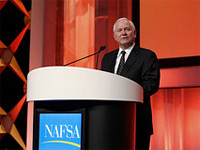Former Secretary of Defense Robert M. Gates on International Education and Security
 Robert M. Gates, chancellor of The College of William & Mary in Williamsburg, Virginia, served as the 22nd secretary of defense of the United States (2006–2011) and is the only secretary of defense to be asked to remain in that office by a newly elected president. President Obama awarded Gates the Presidential Medal of Freedom, America’s highest civilian honor.
Robert M. Gates, chancellor of The College of William & Mary in Williamsburg, Virginia, served as the 22nd secretary of defense of the United States (2006–2011) and is the only secretary of defense to be asked to remain in that office by a newly elected president. President Obama awarded Gates the Presidential Medal of Freedom, America’s highest civilian honor.
Before becoming secretary of defense, Gates was the president of Texas A&M University, the nation’s seventh largest university. Gates was the opening plenary speaker at NAFSA’s 2012 Annual Conference in Houston, Texas.
International Educator: What is international education’s role in our nation’s security? Why is it important for future leaders to study abroad?
Gates: We cannot begin to understand other countries and deal with security challenges around the world if we don’t have leaders—not just in government but in other sectors as well—who understand those cultures and the history and something about those nations’ interests. And the best way that people can get a foundation for that is by having both direct experience and studying it in school.
And I think it works both ways: we have had enormous success over the years with students coming to this country, including as adults to professional schools and professional military schools and learning about us. One extraordinary example is that of Anwar Sadat who had come to this country in the 1950s. He was so impressed that when he replaced Nasser as the president of Egypt, he began a historic turn away from the Soviet Union toward the United States. We’ve had that experience with Pakistani leaders; we’ve had it with a number of others such as Giscard d’Estaing, Helmut Kohl, and several others.
International Educator: Are there any U.S. policies that you think need to be changed to be more inviting to international students and scholars?
Gates: Yes, I think there are actually two policies that could be more welcoming. One is the deemed export issue. [If a foreign national is given access to controlled technology while in the United States, an “export” requiring an export license is “deemed” to have occurred.] I had hoped that we would make progress in getting this issue resolved in terms of making American campuses more welcoming to international students, particularly those studying the sciences and math and technology.
Trying to put the burden on U.S. universities to monitor the access foreign students have, the lab equipment, test equipment, and things like that is literally unmanageable. And I also think that it discourages people from coming here. I think we can figure out what kind of major people are pursuing and what they are working on and keep track of that a lot easier than we can monitor physical access. I think that changes should be made.
The Department of Commerce sponsored a working group on this several years ago, which I cochaired until I became secretary of defense, with a view to simplifying these rules and making them more manageable. I think that that effort was not ultimately successful, and we need to return to it.
The other issue is that we should be making it easier for international students who graduate from our universities, particularly those with a background in finance and math, to remain here and work rather than essentially forcing them to go home. There are a limited number of visas available for people to do this, but clearly the demand for such skills far outstrips what the visas provide for, so I think that’s another area we need to look at.
This is an abridged excerpt of “International Education and National Security,” which appeared in the November/December 2012 issue of International Educator magazine. Read the full article.
